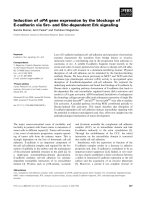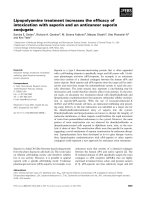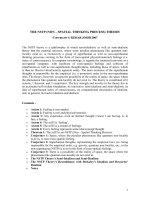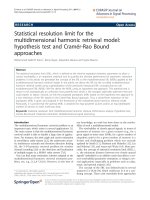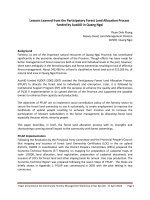The Financial Management Toolkit The Missing Financial Management Planning Process Theory and Tools Guide ITIL Compliant_9 doc
Bạn đang xem bản rút gọn của tài liệu. Xem và tải ngay bản đầy đủ của tài liệu tại đây (113.28 KB, 13 trang )
Financial Management Workbook
Page 104
Financial Management Workbook
Page 105
3.14 Example NPV Decisions
If the NPV Decision is:
Then the program is:
Positive
Acceptable. It promises a return greater than the
required rate of return
Zero
Acceptable. It promises a return equal to the required
rate of return.
Negative
Unacceptable. It promises a return less than the
required rate of return.
Financial Management Workbook
Page 106
Financial Management Workbook
Page 107
3.15 Example: Model Calculation of a Service Management ROI
Financial Management Workbook
Page 108
Financial Management Workbook
Page 109
3.16 Example Trend Line Analysis
ITIL programme
Effect of programme
Post-programme data
Pre-programme data
Trend projection
TIME
P
E
R
F
O
R
M
A
N
C
E
Financial Management Workbook
Page 110
Financial Management Workbook
Page 111
4 IMPLEMENTATION PLAN
IT Services
Implementation Plan/Project Plan
Skeleton Outline
Process: Financial Management
Status:
Version: 0.1
Release Date:
Financial Management Workbook
Page 112
Planning and Implementation for Financial Management
This document as described provides guidance for the planning and
implementation of the Financial Management ITIL process.
The document is not to be considered an extensive plan as its topics have to
be generic enough to suit any reader for any organization.
However, the reader will certainly be reminded of the key topics that have to
be considered for planning and implementation of this process.
1. Initial planning
When beginning the process planning the following items must be completed:
CHECK
☺ or
2 or
date
DESCRIPTION
Get agreement on the objective (use the ITIL definition), purpose,
scope, and implementation approach (e.g. Internal, outsourced, hybrid)
for the process.
Assign a person to the key role of process manager/owner. This
person is responsible for the process and all associated systems.
This will person will generally be someone aligned to the Service
Delivery role, or a new position.
Conduct a review of activities that would currently be considered as an
activity associated with this process. Make notes and discuss the “re-
usability” of that activity.
Three key activities of Financial Management are:
• Gathering Financial Requirements
• Designing the Budget
• Designing and implementing the costing model under the
accounting activities
• Designing and agreeing upon a charging model and policies
Create and gain agreement on a high-level process plan and a design
for any associated process systems. NOTE: the plan need not be
detailed. Too many initiatives get caught up in too much detail in the
planning phase. KEEP THE MOMENTUM GOING.
Review the finances required for the process as a whole and any
associated systems (expenditure including people, software, hardware,
Financial Management Workbook
Page 113
accommodation). Don’t forget that the initial expenditure may be higher
than the ongoing costs. Don’t forget annual allowances for systems
maintenance or customizations to systems by development staff.
Agree the policy regarding this process
2. Create Strategic statements
\\\
Policy Statement
The policy establishes the “SENSE OF URGENCY”
for the process.
It helps us to think clearly about and agree on the reasons WHY effort is put
into this process.
An inability to answer this seemingly simple, but actually complex question is
a major stepping stone towards successful implementation
The most common mistake made is that reasons regarding IT are given as
the WHY we should do this. Reasons like to make our IT department more
efficient are far too generic and don’t focus on the real issue behind why this
process is needed.
The statement must leave the reader in no doubt that the benefits of this
process will be far reaching and contribute to the business in a clearly
recognizable way.
Objective Statement
When you are describing the end or ultimate goal for a unit of activity that is
about to be undertaken you are outlining the OBJECTIVE for that unit of
activity.
Of course the activity may be some actions for just yourself or a team of
people. In either case, writing down the answer to WHERE will this activity to
me/us/the organization is a powerful exercise.
There are many studies that indicate the simple act of putting a statement
about the end result expected onto a piece of paper, then continually referring
to it, makes achieving that end result realistic.
As a tip regarding the development of an objective statement; don’t get caught
up in spending hours on this. Do it quickly and go with your instincts or first
thoughts – BUT THEN, wait a few days and review what you did for another
short period of time and THEN commit to the outcome of the second review
as your statement.
Refer to Policies, Objectives and Scope for more template information regarding
Policy, Objective and Scope statements.
Financial Management Workbook
Page 114
Scope Statement
In defining the scope of this process we are answering what activities and
what “information interfaces” does this process have.
Don’t get caught up in trying to be too detailed about the information flow into
and out of this process. What is important is that others realize that
information does in fact flow.
For example, with regard to the FINANCIAL MANAGEMENT process we can
create a simple table such as:
Financial Management Information flows
Process Process Information
Financial
Management
to Problem
Management
Cost estimates
Problem
Management
to Financial
Management
Actual Costs
Financial
Management
to Change
Management
Cost estimates
Change
Management
to Financial
Management
Actual Costs
Financial
Management
to Service
Level
Management
Pricing Guidance
Service
Level
Management
to Financial
Management
Customer cost restraints
Disaster Recovery Workbook
Page 115
3. Steps for Implementation
There can be a variety of ways to implement this process. For a lot of organizations
a staged implementation may be suited. For others a “big bang” implementation –
due to absolute equality may be appropriate.
In reality however, we usually look at implementation according to pre-defined
priorities. Consider the following options and then apply a suitable model to your
own organization or case study.
STEPS NOTES/ /RELEVANCE/DATES/WHO
Define the Objective and Scope for Financial
Management
Establish and agree on a clear definition for the words:
• Budgeting
• Accounting
• Charging
• Incremental Budgets
• Zero-based Budgets
This is one of the most interesting aspects. It can be very
difficult to get everyone to agree to a definition, and it can
be very difficult to establish the correct understanding of
the definition.
However, get this right, and the rest of the process is
made easier.
Seek initial approval
See Business Justification Document for further
information.
Establish and Define Roles and Responsibilities for the
process. Appoint a Financial Manager.
See Financial Management Process Manager for
further information.
Establish and Define the Scope for Financial
Management and the relationships with IT Services
Establish Financial Management Process
See Objectives and Goals for further information.
Establish and Define Relationship with all other
Disaster Recovery Workbook
Page 116
processes.
This is another key aspect of the Financial Management
process. Financial Management is where we are helping
set the expectations of service and influence their
perceptions. Financial Management works closely with
Service Level Management to achieve this.
Establish monitoring levels.
Financial Management as seen by the business is related
to the service and not the components that make up the
service.
See Reports, KPIs and other Metrics for further
information.
Define reporting standards
Publicize and market
The priority selection has to be made with other factors in mind, such as competitive
analysis, any legal requirements, and desires of “politically powerful influencers”.
4. Costs
The cost of process implementation is something that must be considered before,
during and after the implementation initiative. The following points and table helps to
frame these considerations:
(A variety of symbols have been provided to help you indicate required expenditure,
rising or falling expenditure, level of satisfaction regarding costs in a particular area,
etc.)
Initial During Ongoing
Personnel
Costs of people for initial design of process,
implementation and ongoing support
0 /
Accommodation
Costs of housing new staff and any associated new
equipment and space for documents or process related
concepts.
☺
Software
New tools required to support the process and/or the
costs of migration from an existing tool or system to the
new one.
Maintenance costs
